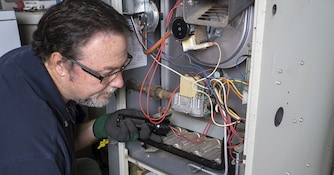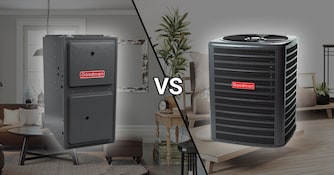
Are You Ready for The Snow?
Dreading the inevitable snowstorm and polar vortex heading your way? We know how that can feel. While you prepare, take five minutes and make sure your home is helping your case, not hurting it.
1. Check Your Outdoor Units
On the sides of your house you may notice vents, AC Units, Heat Pumps, etc. that can easily become covered with snow and ice. Pour some salt around the base of these units to deter ice forming, and routinely clear snow away from any vents or intakes that you see. This will make sure your equipment avoids unnecessary damage during extreme storms.
2. Retain as Much Heat as Possible
 When temperatures outside drop below zero and wind chill factors in, heat becomes precious. Your home loses heat through exterior surfaces, especially those without insulation, like doors and windows.
When temperatures outside drop below zero and wind chill factors in, heat becomes precious. Your home loses heat through exterior surfaces, especially those without insulation, like doors and windows.
Hang blankets or use various plastic window sealers to avoid losing as much as possible. This will keep your heating system from having to work as hard, and reduce the amount of energy you’ll expend during times when power and utility outages can become a problem.
3. Use Surge Protectors
Power outages are a big problem during storms when rescue and restorative power may take hours or days. Ensuring that your system doesn’t unnecessarily shut down, make sure your large electronic devices are plugged into surge protectors or surge-protected outlets. This can not only net you up to 30% more life out of those appliances, but also help you to avoid unnecessary outages.
4. Avoid Frozen Pipes
 Even if you have power, frozen pipes can become an issue and can lead to worse problems when they thaw and burst. To ensure that this doesn't happen, take a few minutes to prepare for the cold. Disconnect all outdoor gardening hoses or water connections.
Even if you have power, frozen pipes can become an issue and can lead to worse problems when they thaw and burst. To ensure that this doesn't happen, take a few minutes to prepare for the cold. Disconnect all outdoor gardening hoses or water connections.
Routinely turn on faucets in the house ever so slightly, allowing them to drip lukewarm water. If your faucet or pipes do begin to freeze, use a good hair dryer or warm wet towel. Thaw the water pipe, beginning where the faucet comes in through your foundation by ensuring that it is ‘on,’ and begin to move your way down the pipe.
5. Reduce the Heat and Put on a Sweatshirt
 Your system will be working overtime during periods of extreme cold. Throw on a sweatshirt and drop your overall temperature a few degrees. This will conserve energy and fuel and will keep your system from working too hard.
Your system will be working overtime during periods of extreme cold. Throw on a sweatshirt and drop your overall temperature a few degrees. This will conserve energy and fuel and will keep your system from working too hard.
When the Power Goes Out, Be Ready
If the power, heat, or water goes out, you need to be ready. Know where helpful items are to avoid wasted time searching. Know which rooms are unneeded and able to be closed off, stuffing towels and rags under doors. This will keep the heat in the most populated and useful areas.
If you have a fireplace, use it. If not, use space heaters and make sure to layer clothing and try to remain in the same room as other people to raise the overall temperature of the area.





